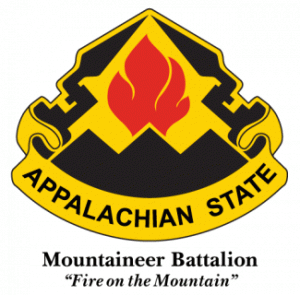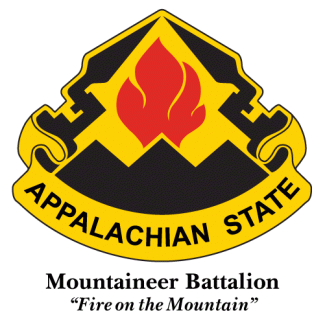This past summer nineteen ASU Mountaineer ROTC Battalion Cadets attended the cadet Leadership Course (CLC). The Cadet Leaders Course is now held annually at Fort Knox, Kentucky. The U.S. Army's largest training exercise, CLC is the U.S. Army Cadet Command's capstone training event. The purpose of the course is to train U.S. Army ROTC Cadets to Army standards, to develop their leadership skills, and to evaluate their officer potential. Most Army Cadets attend CLC between their junior and senior undergraduate years after having contracted to join the Army. Successful completion of CLC is a prerequisite to becoming an Army officer through ROTC. A few of the Cadet's wrote of their experience:
Cadet Marissa Krzysko, Senior, Chemistry Major
Fort Knox, Kentucky is too hot, too buggy, too damp, and the perfect place to hold summer training for cadets. If nothing else, the weather places thousands of college students out of their comfort zone for several weeks, almost half of those without a shower. This smelly discomfort brought the different platoons and squads together in a way that nothing else could. While the material covered isn't necessarily new, the experience of working with different cadets from different schools with slightly different methods of doing the same things was a learning point on its own. To be successful in the mock deployment cadre work so hard to make realistic, cadets have to overcome these differences in SOPs. They need to figure out how to switch between being a leader and a follower, performing both roles sufficiently. The time in the field is long and filled with irritability, exhaustion, and hunger, as MREs are the primary form of food. This mixture of obstacles certainly blocked my squad a few times, but in the end, we came out as close friends with a plethora of inside jokes. Before attending camp, I heard that the cadets in a platoon will make or break the experience. That's definitely true. With so many factors ready to make the trip miserable, the cadets need to be willing to bring a good sense of humor and positivity to their respective platoons. With few exceptions, the students I spent thirty-one days with approached situations with appropriate levels of seriousness and comic relief. I found myself enjoying the field more than I thought; it was easily my favorite training of camp. Aside from treading in the Kentucky woods for twelve days, camp is filled with tests, obstacle courses, and a lot of cleaning. While these activities aren't exactly physically draining, they tested my mental strength and encouraged comradery in a different way, which I think is the main takeaway. It's easy to get into a groove with the cadets at school, but it's a challenge to bond with a new group and figure out how to work efficiently with each other. Camp will bring out some tough personalities. It'll be easy to get angry. Maintaining a respectful attitude with peers is hard, but it's practiced constantly at Fort Knox. I didn't learn new tactics or techniques, but I did come out with more confidence, more leadership qualities, and more friendships that'll last well into my military career.

Cadet Krzysko (center right) and squad mates.
Cadet Jared Stratton, Senior, Business Management Major
This past summer of mine was spent at Fort Knox Kentucky where I completed Cadet Advanced Camp. I was a member of 7th Regiment, Bravo Company, 4th platoon, 4th squad. The month or hard training began on July 1st when I flew to Kentucky and was in processed after an hour long bus ride. The next few days were spent setting up squad SOP's and finishing the long arduous process of ensuring all my medical paperwork, equipment, and knowledge base were up to par. Once I was squared away as well as everyone else, we began training. This included a confidence course, a leadership course, a rappel tower, as well as basic weapons training. My squad bonded seamlessly during this process, especially during the confidence course where we all learned about each other's strengths and weaknesses both mentally and physically. Despite having little to no sleep each night and having long slow days at first, we all fought to keep moral high, and for the most part it worked. Having such a close knit squad would serve us well once we finished with the garrison portion of training and headed into the field for 12 days of intense live-action training. We were dropped out in the woods of Fort Knox around 4 miles from any sort of modernity and our only comforts were our woobie and porta-johns. We spent the entire two week period practicing our platoon operations and ensuring our patrol bases were sound. We received valuable KLE, IED, and medical training and used this knowledge during our missions. After conducting numerous KLE's, security halts, and attacks, we accomplished our mission and were able to leave the field. Upon the 6 mile march back, I had time to reflect upon what I had learned about myself, my comrades, and the Army. I was afforded the opportunity to grow not only as a leader but as a person and I think whether I was consciously improving or not, I still grew. Graduation came quickly after that and although I was relieved to have completed a successful month in Kentucky, I was morose to leave my squadmates. We had grown exceptionally close during the month and even now I continue to keep in contact with most. I am thankful to have finished training and to have grown as a person but most of all, I am thankful to have met such excellent men and women who I am proud to call my friends as well as future leaders in the United States Army.
Cadet Mac Shelton, Senior, Finance and Banking Major
While getting on a plane in mid-July and realizing that the last summer break of my college career had come to a close was slightly disheartening, a few weeks later I was grateful for the opportunity to spend my last month of summer at Fort Knox, KY with the 10th Regiment, Advance Camp. Camp taught me more about patience, teamwork, and real leadership than any weekend-long FTX or semester in a classroom could have. The time my platoon spent together in the field and in garrison afforded us a unique opportunity to develop our character, teamwork, and leadership.
In addition, our training was specifically engineered to allow us free range to solve problems how we saw fit. In the days leading up to the field, I began to dread what I expected to be two weeks of lane after lane, maybe loosely tied together with a forced plotline. However, my expectations could not have been further off. The entire field problem built upon itself up until our final confrontation with the opposing forces, giving us a chance to work through mistakes and improve on successes as we went along.
We heard lectures from a few of the most impressive individuals I have had the pleasure of listening to, from Major General Christopher Hughes to four-star General David Perkins. We heard from civilian business leaders as well as a long list of dedicated and motivating cadre, who made the whole experience worthwhile.
Most importantly, we grew together as a squad, platoon, company, and regiment, and ultimately as a mission set of future lieutenants. I feel much more equipped to lead soldiers now than I did in June, and I have my cadre and classmates at Advance Camp to thank for it. I may have missed my summer break for the first few days, but I would trade more than just a month off from school for the personal development I experienced in Kentucky.

